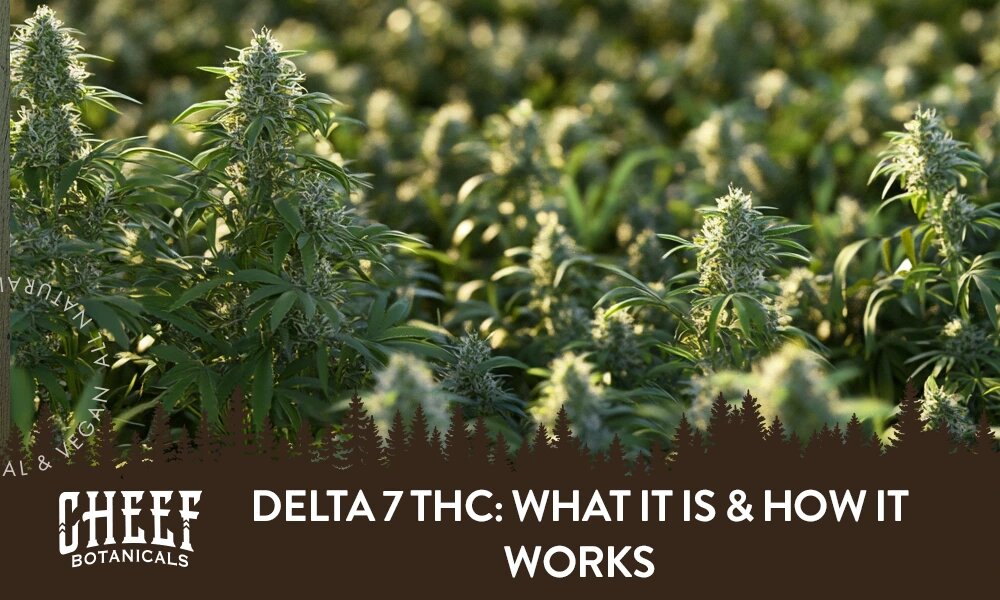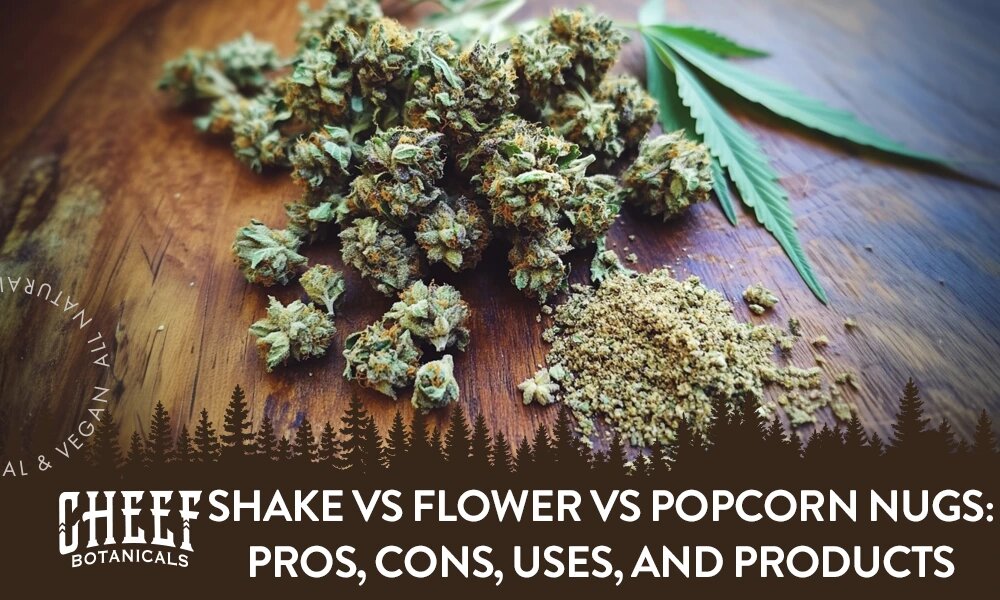Hemp is full of exciting cannabinoids, and Delta 7 THC is one of the newest, catching people’s attention. If you’re into experimenting with new cannabinoids, you might be curious about this lesser-known THC variant. Delta 7 THC is made through specific chemical reactions and has some unique properties that make it stand out.
Even though Delta 7 THC is still pretty new, researchers are already exploring its potential. It’s part of the THC family but offers something a little different.
Want to know more about how it’s made, what it does, and why it matters? Keep reading as this guide will break it all down for you.
What Is Delta 7 THC?
Delta 7 THC is a synthetic cannabinoid, meaning it doesn’t naturally occur in large amounts in the hemp plant like CBD or delta 9 THC. Instead, it’s synthesized in a lab by carefully changing the structure of already existing cannabinoids. This process results in a unique compound that interacts with the body’s endocannabinoid system (ECS) in its own way, offering effects that are different from other THC isomers.
Because delta 7 THC is still new and not yet widely available, there’s no established method for producing it efficiently. Currently, making delta 7 THC is an expensive process, so it’s not being manufactured commercially just yet.
However, chemists have studied it to explore its psychoactive properties, potential uses, and possible benefits. While there’s a lot to learn about this cannabinoid, its rarity and uniqueness make it a topic of growing interest among researchers and cannabis enthusiasts.
The Discovery of Delta 7
Delta 7 THC was discovered by chemists during research into the THC family. They created it in labs to study its psychoactive effects and potential uses. Unlike delta 9 THC, which is found in abundance, delta 7 exists in tiny amounts in the hemp plant. To study it, scientists had to synthesize it by altering the structure of other cannabinoids. This breakthrough in medicinal chemistry opened up new possibilities for exploring lesser-known cannabis compounds.
How Delta 7 Differs from Other THC Variants
Delta 7 THC is different from other THC cannabinoids like delta-8 and delta-9 because of how it’s made. It doesn’t naturally exist in large amounts in hemp, so scientists must create it synthetically. Its psychoactive effects seem milder than delta-9 but still provide an elevated experience. Since delta 7 is so rare and costly to produce, it’s not commercially available yet. This uniqueness has sparked interest among researchers, paving the way for more discoveries in cannabis science.

How Does Delta 7 THC Work?
Delta 7 THC works by interacting with your body’s endocannabinoid system. The ECS is like your body’s control center, helping manage things like mood, sleep, pain, and appetite. Delta 7 THC mainly targets CB1 receptors in the brain, which are responsible for creating psychoactive effects and changes in perception.
This connection to CB1 receptors is what also makes delta-7 THC stand out. Unlike other cannabinoids, it focuses more on these receptors, leading to unique effects compared to delta 8 or delta 9 THC. Its role in the ECS helps explain why it creates an elevated experience for those consuming it.
Interaction with Cannabinoid Receptors
Delta 7 THC mainly targets CB1 receptors in the ECS, which play a big role in how the brain and body process cannabinoids. These receptors are responsible for influencing mood, sensory perception, and overall psychoactive effects. By binding to CB1 receptors, delta 7 may create feelings of euphoria or an elevated mind state, depending on the dose consumed.
CB2 receptors, located in immune cells and other tissues, are less involved with delta 7 THC. While some cannabinoids like CBD influence both CB1 and CB2, delta 7’s focus on CB1 sets it apart. This specific receptor targeting could explain why delta 7 offers unique experiences compared to other cannabinoids.
Effects of Delta 7 on the Body and Mind
Delta 7 THC may elevate your mood, alter your senses, and change the way you perceive things. It connects with CB1 receptors in the brain, which is why it has noticeable psychoactive effects. Some people also experience appetite stimulation, a common feature of THC cannabinoid.
The intensity of the effects varies with the amount consumed. Smaller doses might feel subtle, while higher doses could lead to a stronger, more euphoric experience. Delta 7’s effects are unique, making it a potential new option for those exploring THC products.
Delta 7 THC vs. Other Cannabinoids
Delta 7 THC is part of the THC family, but it’s quite different from other cannabinoids like delta 8, delta 9, and CBD. Each has its own chemical structure, which impacts how it works with the body and the effects it provides. These differences influence the type of experience they offer and how they’re used in cannabis products. Let’s explore how delta 7 compares to other cannabinoids:
Delta 7 vs. Delta 9 THC
Delta 7 THC and Delta 9 THC are both THC cannabinoids, but Delta 9 is far more popular and widely used. Delta 9 is stronger than Delta 7. Delta 9 is the primary psychoactive component in cannabis, offering potent, euphoric effects.
If interested, we have Delta 9 THC + Caffeine Gummies and D9-THC Live Resin Gummies, which showcase the versatility of Delta 9 in enhancing energy, mood, and sensory experiences. Delta 7 THC, in contrast, provides a gentler, more balanced effect, making it an appealing choice for those who want something subtler.
Delta 7 vs. Delta 8 THC
Delta 7 THC and Delta 8 THC share similarities but offer distinct experiences. Delta 8 THC is popular for its gentle and soothing effects, perfect for those seeking relaxation. Delta 7 is also mellow, but it's currently rarely available to the public. While D-7 is newer to the scene, it could offer a fresh option for those looking to try something different. For now, delta 8 remains a go-to for relaxation and gentle psychoactive effects.
If you are looking for Delta 8, we offer Premium Delta 8 Gummies, Delta 8 vapes, and Delta 8 tinctures which highlight Delta 8’s versatility.
Comparing Delta 7 to Delta 10 and Delta 11
Delta 7 THC, Delta 10 THC, and delta 11 THC each bring something different to the table. Delta 10 is known for uplifting and energetic buzz, making it great for daytime use. Delta 11 is much stronger and provides intense, euphoric effects that can last longer. Delta 7, on the other hand, offers a milder experience, sitting between the two in terms of potency.
With delta 9 being one of the most popular cannabinoids, it often serves as a benchmark for comparing newer options. Delta 10 and Delta 11 have already earned their places in the cannabis industry, but Delta 7 could soon offer something unique. As more research unfolds, delta 7 may provide a new option for cannabis enthusiasts exploring tailored effects.
Potential Benefits of Delta 7 THC
Delta 7 THC is gaining attention as a unique cannabinoid with potential benefits. While still being studied, its mild effects and interaction with the endocannabinoid system make it worth exploring. From gentle psychoactive properties to possible support for relaxation and focus, delta 7 offers an exciting option for cannabis enthusiasts.
Mild Psychoactive Properties
Delta 7 THC stands out for its mild psychoactive properties. Unlike delta 9 THC, which can feel intense, delta 7 offers a smoother, more balanced experience. This makes it a great choice for people who want a slight buzz without feeling too altered. It connects with CB1 receptors in the brain, which helps create its uplifting effects.
Higher doses of delta 7 THC may offer a stronger experience, but it’s still considered less potent than delta 9 THC. For consumers, the gentler effects are a perfect middle ground between relaxation and focus. As researchers continue to explore this cannabinoid, its unique effects are becoming more clear.
Anecdotal Benefits for Relaxation and Focus
Many people say Delta-7 THC helps with relaxation and feeling centered or grounded. Unlike some cannabinoids that can feel heavy or sedating, Delta-7 seems to create a sense of calm without slowing you down. This makes it great for unwinding while still staying mentally in tune.
Its effects may also pair well with other cannabinoids, like CBD or delta 8 THC, for more customized results. Delta 7 THC’s potential to balance relaxation and focus is one reason it’s gaining attention in the world of cannabinoids. With more people trying it, the buzz around its benefits is only growing.
Is Delta 7 THC Legal?
The legal status of delta 7 THC can be a bit tricky to pin down. At the federal level, the Farm Bill of 2018 made hemp and hemp-derived cannabinoids legal, as long as the products contain less than 0.3% delta 9 THC. Since delta 7 THC is a newer THC isomer, it falls into a legal gray area. While it’s not specifically listed as a controlled substance, its legality often depends on how it’s produced and the interpretation of federal law.
State laws add another layer of complexity. Some states follow federal guidelines and allow cannabinoids like Delta 7 THC, while others have stricter regulations banning certain cannabis products or any psychoactive compounds.
The legality of Delta 7 can change depending on the laws in your state or country. Before purchasing or consuming Delta 7 THC, it’s important to check both federal and state laws to avoid any risks or restrictions. As researchers continue to explore cannabinoids like D-7, its legal landscape may evolve in the future.
How to Consume Delta 7
Delta 7 THC can be enjoyed in various ways, depending on your preferences and needs. Popular products like gummies, tinctures, vape carts, and capsules offer flexibility in how you experience its psychoactive properties. Each method has its own benefits, allowing you to choose what works best for your needs.
- Gummies. A tasty and discreet option, perfect for controlled and consistent dosing. Chew and swallow like regular candy, and expect the effects to kick in within 30-60 minutes.
- Tinctures. Provides precise dosing by placing drops under your tongue. Hold the drops for 30-60 seconds before swallowing for quicker absorption.
- Vape Carts. Inhale gently through a compatible vape pen for fast-acting effects, great for immediate results.
- Capsules. A simple and pre-measured option. Swallow with water for an easy and discreet way to consume.
- Topicals. Apply directly to the skin for localized effects, though this method doesn’t produce psychoactive effects.

Safety and Potential Side Effects of Delta 7 THC
Like other THC cannabinoids, delta 7 THC may clead to some mild side effects, especially for first-time users. These can include mild dizziness, dry mouth, or changes in mood. Thankfully, these effects are temporary and usually subside as your body adjusts.
To minimize discomfort, it’s best to start with a low dose and slowly work your way up. This approach helps you find the right balance while avoiding unwanted surprises. For safe and responsible consumption, here are some tips to keep in mind:
- Start with Low Doses. Begin with a small amount, especially if you’re new to delta-7. This supports your body’s adjustment and keeps the psychoactive effects more manageable.
- Avoid Mixing Substances. Mixing delta 7 with alcohol or other substances can increase risks of side effects. Stick to consuming it on its own for the best and safest experience.
- Use in a Comfortable Setting. Choose a calm and familiar environment when trying delta 7 for the first time. This can help you stay relaxed and enjoy the experience.
- Stay Hydrated. Dry mouth is a common effect of THC. Keep water nearby to stay hydrated and comfortable while consuming.
- Avoid Driving or Operating Machinery. Delta-7 THC can alter focus and perception, so save tasks that require full attention for later.
The Future of Delta 7
The future of delta 7 THC is exciting as researchers explore its potential. Clinical trials are starting to focus on its psychoactive properties and how it interacts with the endocannabinoid system. These studies aim to understand its effects, benefits, and how it compares to other THC isomers like delta-8 and delta-9.
With more research in progress, delta-7 THC could play a bigger role in cannabis products. As we learn more, it might become a popular option for those looking for new and unique cannabinoid experiences.
Final Thoughts - Delta 7 THC
Delta 7 THC is a unique THC isomer that’s generating interest for its gentle buzz and potential benefits. Unlike more common cannabinoids like delta 8 and delta 9 THC, delta 7 is not yet widely available in the market. Its production is still limited, and manufacturers are exploring cost-effective ways to synthesize it. For now, it remains a rare cannabinoid, primarily studied by researchers in clinical trials to better understand its effects and uses.
While Delta 7 THC shows promise, it’s not as accessible as other cannabis products. With ongoing research and advancements in production, Delta 7 THC could soon gain popularity in the cannabis industry. Until then, it’s a cannabinoid to watch for those interested in exploring cutting-edge options in the industry. Always remember to stay informed about its legal status and consume responsibly when it becomes available.






Leave a comment
This site is protected by hCaptcha and the hCaptcha Privacy Policy and Terms of Service apply.